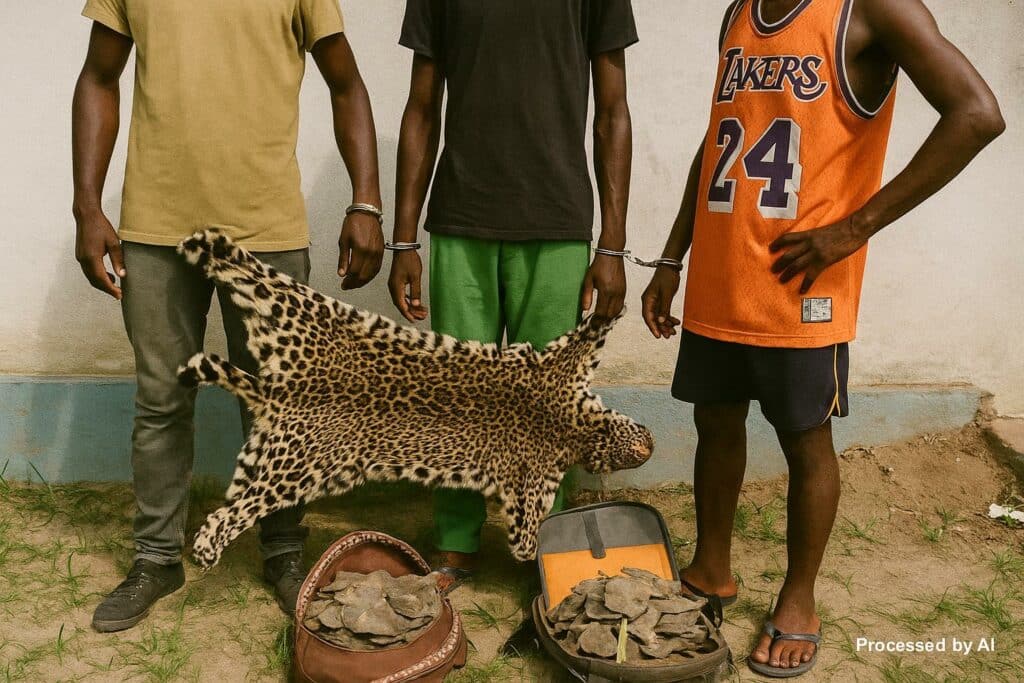A Symbolic Judgment Echoing through Likouala
The quiet river town of Impfondo rarely captures the international spotlight, yet its Tribunal of First Instance has issued a ruling that resonates well beyond the Sangha River basin. On 26 June the court sentenced three Congolese citizens to prison terms of two and three years, complemented by a collective fine of one million CFA francs and civil damages amounting to three million. The defendants admitted to possessing a freshly tanned panther skin, four giant pangolin claws and several kilogrammes of pangolin scales—trophies explicitly banned under Law 37-2008 on Wildlife and Protected Areas. For observers in Brazzaville’s diplomatic community, the judgment is a barometer of the Republic of Congo’s determination to translate treaty obligations into enforceable domestic jurisprudence.
Legal Framework Reflecting Brazzaville’s Commitments
Promulgated fifteen years ago, Law 37-2008 enshrines the country’s adherence to the Convention on International Trade in Endangered Species and the African Union’s 2014 Strategy on Illegal Wildlife Trade. Article 113 of the statute renders any import, export, transit or mere possession of trophies from fully protected species an offence unless a scientific derogation is granted. According to Magistrate Clarisse Mokoko, who supervised the Likouala proceedings, the recent decision “demonstrates that the statute is functional, not ornamental.” Her remark echoes the vantage point of regional experts at the Central African Forests Commission, who have long argued that successful conservation hinges on visible sanctions, thereby reinforcing Congo-Brazzaville’s credibility in multilateral climate and biodiversity fora.
From Arrest to Verdict: Anatomy of an Investigation
The operation that culminated in the sentencing began on 27 May, when gendarmes, supported by the Departmental Directorate of Forest Economy and technical staff from the Wildlife Law Enforcement Support Project, intercepted Jodel Mouandola and Arel Ebouzi in Impfondo’s river port. A subsequent sting in Épéna led to the arrest of Parfait Mbekele, alleged owner of the trophies. Investigators traced the route of the contraband to informal riverine networks connecting northern Congo to markets across the Ubangi–Uélé frontier. Colonel Armand Itoua of the Likouala gendarmerie noted that the coordination between law-enforcement and forestry agents “sets a procedural benchmark we intend to replicate elsewhere in the department.” For prosecutors, the judicial transparency of public hearings, during which the accused acknowledged their intent to sell the items, pre-empted any allegation of procedural impropriety.
Regional Implications for Biodiversity Diplomacy
Congo-Brazzaville shares 5,000 kilometres of porous forest borders with five neighbours, making it both a transit and source country for trafficked wildlife. The United Nations Office on Drugs and Crime’s most recent threat assessment ranks pangolin scales among the continent’s fastest-growing black-market commodities, commanding prices that can exceed those of ivory in certain Asian destinations. Within such a landscape, the Likouala verdicts carry a diplomatic signal: Brazzaville is stepping up to its stewardship duties in the Congo Basin, the world’s second-largest tropical rainforest. Delegates preparing for the upcoming Three-Basins Summit in Kinshasa privately acknowledge that judgments of this calibre facilitate access to climate finance mechanisms premised on demonstrable rule-of-law credentials.
Balancing Rural Livelihoods and Preservation Goals
Notwithstanding the celebratory tone among conservationists, officials remain attentive to socioeconomic realities. In Likouala, where per-capita income lags behind the national average, bushmeat and derivative sales still supplement subsistence agriculture. Dr Charlotte Moulongo, a socio-economist at Marien Ngouabi University, stresses that “enforcement, though indispensable, must be matched by alternative livelihood programmes if we are to avoid displacing the problem.” The Ministry of Forest Economy has therefore prioritised community forestry initiatives and sustainable cocoa schemes, financed in part by the Congo Basin Forest Partnership. Such measures are designed to ensure that punitive action against trafficking does not inadvertently exacerbate rural poverty, a concern frequently raised by parliamentarians from northern constituencies.
Prospects for Enhanced Multilateral Cooperation
Looking forward, the Likouala sentencing is poised to inform discussions between Brazzaville and technical partners, including the European Union’s Ecofac 6 programme and the German-funded Biodiversity and Forests project. Embassy sources indicate that additional capacity-building workshops for magistrates and customs officers are under consideration, aimed at standardising evidentiary protocols across Congo’s judicial districts. The Supreme Court is also reviewing a draft circular that would expedite wildlife cases, thereby reducing opportunities for witness intimidation. By coupling robust national enforcement with multilateral support, the Republic of Congo strengthens its negotiating hand in global environmental diplomacy, all while safeguarding emblematic species such as the giant pangolin and the forest leopard.

